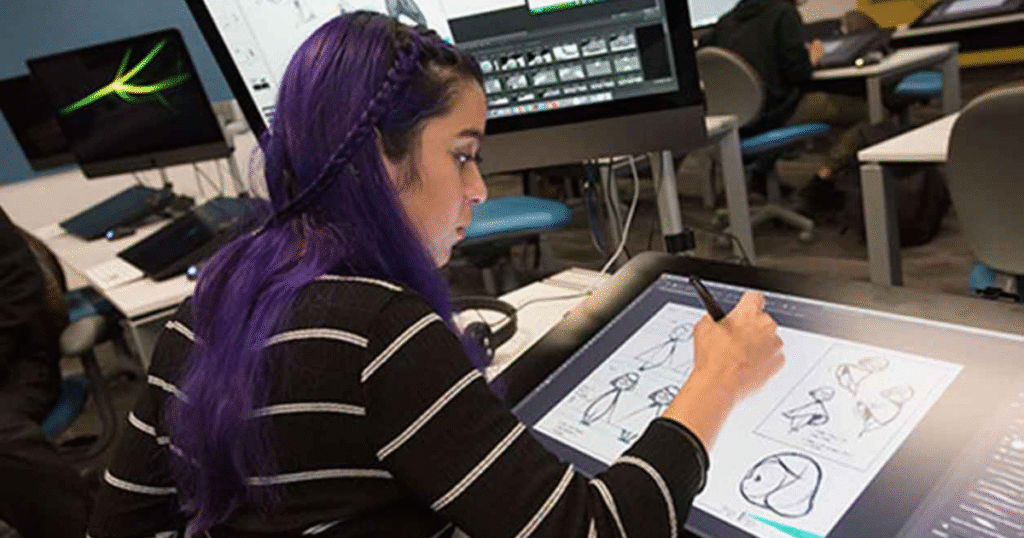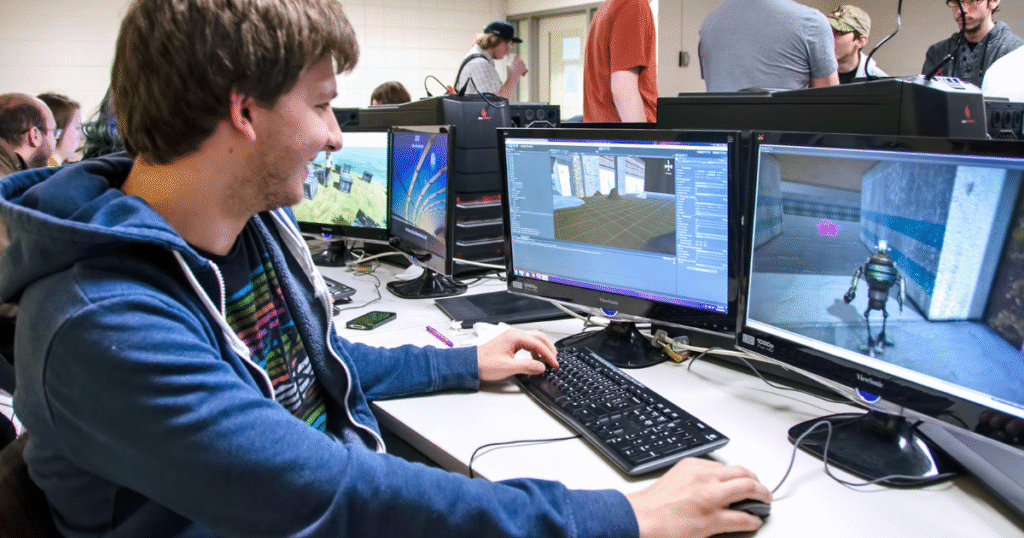The gaming industry is one of the fastest-growing industries in the world today. With technological advancements and a surge in online gaming, the demand for skilled game developers is increasing rapidly. UK universities offer a variety of game development courses of game design, programming, and production.
Game development is not just about creating fun games. It involves complex processes such as coding, 3D modeling, sound design, and storytelling. If you’re someone who wants to create a career in game development course could be the right choice.
In this article, we will explore the various game development courses offered by UK universities. We will also look at the benefits of studying in the UK, the types of courses available, and the career opportunities for graduates. Additionally, we will answer some frequently asked questions to help you make an informed decision.
Overview Of Game Development Courses in The UK
Game development courses in the UK are designed to give students a strong foundation in both the technical and creative aspects of game design. These courses typically cover areas such as game programming, animation, 3D modeling, and user experience design.
The UK is home to some of the most prestigious universities offering game development programs. Whether you are interested in programming or the artistic side of game creation, there are courses that cater to your specific interests. Courses range from undergraduate degrees to postgraduate and short-term diplomas.
Benefits Of Studying Game Development in The UK
The UK offers a supportive environment for students interested in game development. The country has a strong gaming industry, which means that students can benefit from networking opportunities and collaborations with industry experts.
- Access to cutting-edge technology and tools
- Opportunities to work on real-world projects
- Networking with industry professionals
- High-quality education standards
- Exposure to the latest trends in gaming
Many UK universities collaborate with leading game studios to provide students with industry insights and real-world projects. Some of the key benefits of studying game development in the UK include:
Top Universities Offering Game Development Courses
The UK has some of the best universities for studying game development. Several universities in the UK are renowned for their game development programs. Some of the top institutions include:
- University of Abertay: Known for its focus on game development and digital media.
- Staffordshire University: Offers a range of courses in game design, programming, and animation.
- University of Portsmouth: Provides specialized courses in game technology and art.
- University of the Arts London: Focuses on creative game design and interactive media.
- Teesside University: Known for its strong industry connections and hands-on approach.
In top choices include the University of Southampton, which offers creative courses in game design and programming. These universities help students build skills for exciting careers in the gaming industry.
Types Of Game Development Courses Available
These courses include game design, which focuses on creating game ideas and rules, and game programming, which teaches coding and software development. Some courses specialize in 3D modeling and animation to create realistic game characters and environments. UK universities offer various types of courses in game development, including:
- Undergraduate Degrees: Bachelor’s programs in game design, programming, and art.
- Postgraduate Degrees: Master’s degrees for those who want to specialize further.
- Short Courses and Diplomas: For students looking to enhance specific skills like 3D modeling or animation.
Advanced courses may focus on virtual reality (VR) or artificial intelligence (AI) in gaming. These courses vary in length, content, and focus, allowing students to choose a program that aligns with their career goals.
Game Programming Courses
Game programming is one of the most technical aspects of game development. It involves writing the code that makes games function. UK universities offer courses that teach students how to use programming languages like C++, Python, and Java. These courses often include modules on artificial intelligence, physics engines, and gameplay mechanics.
Game Design And Storytelling
While coding is essential, designing the game world and creating engaging narratives are equally important. Many UK universities offer game design courses that focus on storytelling, character development, and user experience. These courses teach students how to create immersive and interactive game environments.
3D Modeling And Animation
3D modeling and animation are crucial components of modern video games. Students learn how to create lifelike characters, environments, and special effects. Universities in the UK offer courses that cover everything from basic 3D modeling techniques to advanced animation software like Maya and Blender.
Game Art And Visual Effects
Game art courses focus on the visual aspects of games, including textures, lighting, and special effects. These courses teach students how to create visually stunning games that captivate players.
- Comprehensive Curriculum: Gain expertise in 3D modeling, animation, texturing, and real-time rendering using industry-standard tools.
- Creative Skill Development: Enhance artistic abilities and storytelling techniques to create immersive game environments and effects.
- Industry Connections: Collaborate with professionals through internships, workshops, and networking opportunities.
- Cutting-Edge Technology: Access advanced software, VR/AR tools, and motion-capture studios to refine technical skills.
- Career Prospects: Prepare for roles in game design, film, and VFX industries with guidance from experienced mentors.

Students also learn about different artistic styles and how to adapt them to various game genres.
Sound Design And Music in Games
Sound design plays a significant role in creating an immersive gaming experience. Some universities offer specialized courses in sound design for games, teaching students how to create soundtracks, sound effects, and voiceovers. These courses emphasize the importance of audio in enhancing gameplay and storytelling.
Virtual Reality (VR) And Augmented Reality (AR)
With the rise of VR and AR in gaming, UK universities are incorporating these technologies into their game development programs. Courses in VR and AR teach students how to create interactive virtual environments and integrate them with gaming hardware.
Game Development Software And Tools
Students in game development courses are introduced to industry-standard software and tools. Some of the most commonly used tools include:
- Unity
- Unreal Engine
- Autodesk Maya
- Blender
- Photoshop
- ZBrush
Learning to use these tools is essential for creating professional-quality games.
Collaboration with Industry Professionals
One of the biggest advantages of studying game development in the UK is the opportunity to collaborate with industry professionals. Many universities have partnerships with leading game studios, which allows students to work on real-world projects and gain valuable experience.
Game Development Labs And Studios
UK universities often have state-of-the-art labs and studios where students can work on their game projects. These facilities are equipped with the latest technology, including high-performance computers, motion capture equipment, and VR/AR systems.
Career Opportunities in Game Development
Graduates of game development courses in the UK have numerous career opportunities in the gaming industry. Some potential career paths include:
- Game Programmer
- Game Designer
- 3D Artist
- Animator
- Sound Designer
- Quality Assurance Tester
- Game Producer
Game Development internships And Placements
Many UK universities offer internships and work placements as part of their game development programs. These opportunities allow students to gain hands-on experience and build a professional portfolio, which is crucial for securing a job in the industry.
For those interested in pursuing a career in game development, the United Kingdom is one of the top destinations for education in this field. UK universities provide students with both the theoretical knowledge and practical skills needed to succeed in the gaming industry.
Industry Events And Networking Opportunities
The UK hosts several gaming industry events, such as EGX and Develop Brighton, where students can showcase their work, meet industry experts, and learn about the latest trends in game development. Attending these events can open doors to new career opportunities.
Postgraduate Research in Game Development
For those interested in advancing their knowledge further, some UK universities offer research opportunities in game development. This can involve exploring cutting-edge technologies or working on innovative game design projects.
Several universities in the UK offer scholarships to international students pursuing game development courses. It’s important to research and apply for these funding opportunities early.
The Future Of Game Development in The UK
The future of game development in the UK looks bright. With continuous advancements in technology, the gaming industry is expected to grow even further. UK universities are constantly updating their curricula to ensure that students are equipped with the new skills and knowledge.
Choosing The Right University And Course
When selecting a university and game development course, it’s important to consider factors such as
- Identify Key Criteria: Research universities in the UK with strong game development programs, focusing on rankings, facilities, and industry partnerships.
- Evaluate Course Content: Compare curricula to ensure the program covers game design, programming, and emerging technologies like AR/VR.
- Consider Accreditation: Look for courses accredited by organizations like TIGA or ScreenSkills for recognized industry standards.
- Explore Industry Links: Choose universities offering internships, live projects, or guest lectures from game development professionals.
- Check Alumni Success: Investigate graduate employment rates and notable alumni to gauge the program’s real-world impact.

Take the time to research each university and its programs to find the best fit for your needs.
Frequently Asked Questions
Do I need programming experience to study game development?
While having programming experience can be beneficial, many universities offer beginner-friendly courses that teach the necessary programming skills from scratch.
What software do I need to learn for game development?
The most commonly used software in game development includes Unity, Unreal Engine, Blender, and Autodesk Maya.
Can I work in the gaming industry after completing a degree in the UK?
Yes, many UK universities have strong industry connections, which can help students secure internships and job placements after graduation.
Are there scholarships available for international students?
Yes, many UK universities offer scholarships and financial aid to international students, especially those studying game development.
How long does it take to complete a game development degree?
A bachelor’s degree typically takes three to four years to complete, while a master’s degree can take one to two years.
Final Thoughts
UK universities offer a wide range of game development courses that prepare students for successful careers in the gaming industry. Whether you’re interested in programming, design, or art, there’s a course for you.
Game development is not just about creating fun games. It involves complex processes such as coding, 3D modeling, sound design, and storytelling. The most commonly used software in game development includes Unity, Unreal Engine, Blender, and Autodesk Maya.
With strong industry connections, cutting-edge technology, and experienced faculty, studying game development in the UK is an excellent choice for aspiring game developers.

